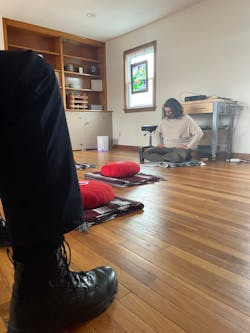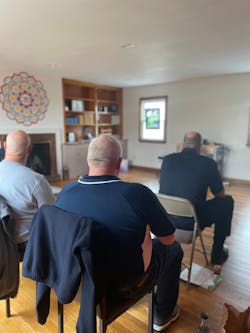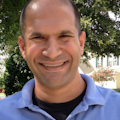Law enforcement officers and other first responders nationwide deal with PTSD and suicidal thoughts on a daily basis. While agencies have explored ways to address this mental health crisis, the stigma surrounding getting help persists and local organizations and businesses are helping fill the gaps.
Two Pittsburgh groups are working with local public safety members on ways to find balance in their personal and professional lives. Stephanie Romero, the founder and executive director of the non-profit Awaken Pittsburgh, and Kristy Weidner, co-owner of the for-profit Village Center for Holistic Therapy, recently spoke to OFFICER Magazine about their program Mindful Connections for Public Safety.
Looking to make a difference
Romero says she was initially hesitant when it came to seeing first responders. Awaken Pittsburgh specializes in meditation and mindfulness for social and emotional regulation and normally deals with educators and healthcare professionals, but she wasn’t sure that her staff, which isn’t trained as therapists, would be able to the handle that level of trauma
“It was the exact right partnership with Kristy, who actually provides those direct services so that we could do a skill building training that helps people learn skills to self-regulate and integrate a few touch points with a therapist who does mindfulness-based therapy,” she says. “This was our idea, which was a totally new idea to take a mindfulness-based intervention that is non-therapeutic and integrating a little bit of therapy.”
The two groups applied for a grant with the Staunton Farm Foundation for the idea and received funding in 2020. “We spent the entire pandemic working on this. I feel like we were planting a lot of seeds that are now starting to grow, so that is pretty exciting,” Weidner says. “This isn’t a population that is jumping for mental health services.”
In early 2021, a small group of first responders were invited to join a regular program to give feedback. That fall, the pilot session included nine attendees, eight of whom had never been in therapy before. The next iteration of the program, which was offered to all of public safety including fire service and dispatchers, was held this past spring. A total of 23 first responders signed up for the latest sessions with about 16 becoming regular attendees. Romero and Weidner have been able to extend the program through a new grant through the Mary Hillman Jennings Foundation.Getting officers to open up
Detective Teresa Gongaware with the Penn Hills Police Department, which shares a border with the city of Pittsburgh, was a part of the initial group invited to the regular program and has stuck with the group. “We don’t want to talk about anything with anybody,” she says. “But once we break that ice in that room where, ‘There’s nothing wrong with me, they are here for the same reason.’ Law enforcement officers love to talk. We will eventually start some really good conversations in that room and then realize out of that room that, ‘Maybe I need to take this a little bit further and go talk to somebody.’ ”
Shaler Township Police Chief Sean Frank and two of his lieutenants took part in the pilot session this past fall. Gongaware says after attending the session, they realized that something like this program could work and have a real impact. “After sitting in there listening to them, we come into a room and get it and understand ‘Oh boy, I’m thinking the same thing that person is thinking. They are thinking the same thing I am thinking. I’m not alone.’ The meditation is more of just checking in with yourself and doing the selfcare. I really think after the past couple of years, when people start to catch on to what is going on here, I think this is going to take off.”
Mindful Connections for Public Safety consists of nine one-and-a-half-hour classes and a half-day class, which allows for deep immersion into practice. “We’ve either been doing hybrid or online,” says Romero. “The hardest thing about scheduling this is police officers’ schedules… They might be called back and not have the off time they needed.” She recalls that one time an officer arrived to a class in uniform, received a call and had to get up and leave. “We were as open and accepting of whatever they were bringing in the moment and there was no rule you have to be there. We tried to accommodate them as much as we could.”
The sessions can be spread out differently depending on the group. Weidner is currently leading a session that consists of four three-hour classes and then the longer half-day class to accommodate the schedule of the law enforcement agency that she’s working with. While the program is a bit of a commitment for officers with already-full schedules, Romero says that is intentional. “What we are trying to do is change the habitual patterns of how we deal with our emotions and how we self-regulate. You can’t do that in a couple sessions,” she says. “Kristy and I are really all about having a large impact, not having a little fluffy thing that makes people feel good. We actually want to give people tools that will last their whole life and prevent serious incidents for them and their families.”
Weidner says that they are often starting from the ground up with the first responders who attend, which is part of why each session needs to be held over a period of time. “Meditation is really hard,” she says. “It’s not what anybody thinks. It’s not clearing all of your thoughts out of your head. It’s not being in a state of calm all of the time. It’s noticing non-judgmentally what comes up for you and being in that moment with it rather than ‘shoving it in the closet.’ ”Making an impact
Gongaware says she is grateful for Awaken Pittsburgh and the Village Center for Holistic Therapy for teaming up to offer the program. “I can’t believe Kristy and Stephanie would take on a group such as law enforcement,” she says. “I knew EMS and the fire service and 911 would get it, but we are far behind with law enforcement. We never want to admit that we can’t handle a situation. We don’t want what we’ve put down in the depths of our souls to come out. We’re a little standoffish when it comes to this.”
She says that one of her biggest mentors on the force was an old partner who was a three-time Vietnam veteran. He used to tell her: “You’ve got to clean the closet out every once in a while. You pack this stuff in boxes, you put it in that closest and if you don’t go in that closet and say ‘I don’t need this box anymore,’ those doors are going to come flying open and you don’t know when it’s going to happen, how it’s going to happen, who it’s going to affect besides yourself.’ ”
Through programs like Mindful Connections for Public Safety, Gongaware believes that officers can be reached. “I think getting guys out there like that, getting them in those rooms, we’re going to open that door, it’s just, we’re a tough crowd,” she says. “We don’t have a very long life expectancy outside of retirement. You can better believe I want to make it until I’m an old woman and I don’t want to be a statistic of this job.” She also stressed that younger officers have to be reached early on so they can begin to take better care of themselves. “They always say, ‘Make sure you go to the gym and work out.’ But they don’t tell you how to take care of your mind in connect it with your body.”
Gongaware has decided that following her retirement from law enforcement she wants to become a counselor for first responders. “I care about it enough to make sure we continue to survive the field,” she says.
Romero stressed that the program is about officers being able to take a moment to get under control in order to decide what to do in the moment. “We’re not trying to tell you how to be. We’re trying to give you skills to regulate so you can be your best self,” she says. She added that if groups in other parts of the country wish to replicate the program in their area, they would be thrilled to talk to them. “This is a need. No one is serving this need. No one is helping folks in this way and we’re on a mission to do this work.”
About the Author
Paul Peluso
Editor
Paul Peluso is the Managing Editor of OFFICER Magazine and has been with the Officer Media Group since 2006. He began as an Associate Editor, writing and editing content for Officer.com. Previously, Paul worked as a reporter for several newspapers in the suburbs of Baltimore, MD.




